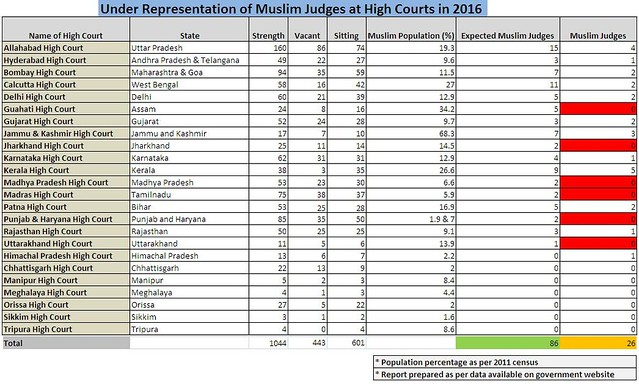By A Mirsab, TwoCircles.net,
New Delhi: The representation of Muslims in higher judiciary does not even come close to community’s share in the population of the country, it has been revealed after studying the data made public by the Department of Justice.
As per 2011 census, Muslims are 14.2% of the overall population but unfortunately there are negligible number of Muslim judges in High Courts and the Apex court.
As per the Department of Justice, in the 24 High Courts of the country, out of 1,044 approved strength, the present strength of the sitting judges is 601 while 443 posts remain vacant. Out of these 601 judges, there are only 26 Muslim judges, meaning the community contributes only 4.3% of overall judges.

But if one were to go by the community’s share in population, there should have been at least 86 Muslim judges out of 601 sitting judges at various High Courts. Moreover, out of this meager number of 26, eight are scheduled to retire this year while three will retire next year, which means the number could fall well below 20 by the next year.
If one looks at state-wise data, the most surprising number comes from Asaam. Even though it happens to be the second-largest Muslim populated state of the country with 34.2% Muslim population, of the 16 sitting Judges at the Guahati High Court, not one is Muslim.
Even in Jammu and Kashmir, where Muslims constitute 68.3% of the population, there are only three Muslim Judges out of 10 sitting Judges. One out of these three will retire next year on January 29.
Hyderabad High Court and Rajasthan High Court have only one sitting Muslim Judge each and both are due for retirement this year, even though Muslims consist of nearly 10% population in these states.
Kerala High Court has the maximum Muslim Judges among all the High Courts. The state has five sitting Muslim Judges, but this number is also less when we consider the community’s population share in the state. Muslims constitute 26.6% of the population in Kerala and hence using that as a parameter, Muslims should have sent nine judges out of 35 sitting Judges to be adequately represented in the Judiciary.
Shockingly, at present there is no Muslim Judges in 12 of the 24 High Courts in the country. Granted, that four of the High Courts in the states of Himachal Pradesh, Chhattisgarh, Meghalaya and Orissa can be ignored due to negligible presence of Muslim community in those regions. But what explains the fact the eight High Courts in Assam, Jharkhand, Madhya Pradesh, Tamilnadu, Punjab & Haryana, Uttarakhand, Manipur and Tripura too have no Muslim Judges despite considerable presence of the community in those respective states?
The figures at Supreme Court are more disappointing for Muslim community than High Courts. Out of 26 sitting judges, there are only two Muslim Justices and both are going to retire this year; which means that the Apex Court will be left with no Muslim face this year.
Advocate A. Mohamed Yusuff, Joint Convener of National Lawyers Network (NLN) who studied this data, opines that proportionate representation should be given to all marginalised communities including Muslims, SCs, STs and BCs, while filling the vacancy of 443 posts at the various High Courts and five posts at the Supreme Court.
Speaking with TwoCircles.net Yusuff said, “In order to address the under representation from minorities (at higher judiciary), especially Muslims, proportionate representation should be given while appointing new Judges”.
“But, this is not the only solution”, Yusuff says adding; “enthusiastic lawyers from Muslim communities should be encouraged and guided for becoming competent Judges by the retiring judges from the community”.
Nevertheless, even if some Muslims may associate ‘lack of reservation’ as a reason for under representation at higher judiciary, this has become a patent rationale that the community sights for every of its problem. In this case, it would not be wrong to say that the buck stops at its own door, at least for such scarcity of Muslim judges at higher judiciary.
Related
Constitution should be amended for reservation in higher judiciary: Madras High Court Judge
